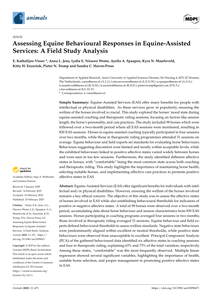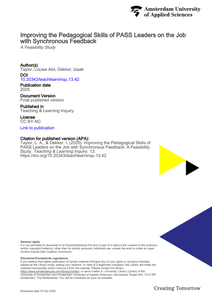Equine-Assisted Services (EAS) offer many benefits for people with intellectual or physical disabilities. As these services grow in popularity, ensuring the welfare of the horses involved is crucial. This study explored the horses’ mood state during equine-assisted coaching and therapeutic riding sessions, focusing on factors like session length, the horse’s personality, and care practices.Keywords: horse–human interaction; welfare; equine-assisted services; health and safety; affective states
DOCUMENT

Supplemental instruction, also known as Peer Assisted Study Sessions (SI-PASS), is a well-established form of peer learning that has been implemented in higher education institutions across the globe and that coincides with learning gains for participants. While the effects on learning gains have been extensively studied with quasi-experiments, the underlying mechanisms that make SI-PASS effective are less well understood. This study explored what benefits students thought SI-PASS offered and through which mechanisms. We studied this by interviewing 14 students who participated in SI-PASS during a field experiment that reliably found a significant impact of SI-PASS on performance. The students were asked to expand on if and why they thought SI-PASS was effective. Thematic analysis and independent coding indicated an interplay of three main drivers. SI-PASS was experienced as effective because it stimulated the use of effective study techniques and social learning. These drivers were facilitated and enhanced by a pedagogical climate that lowered the threshold to engage in collaborative learning and effective study techniques. These findings could help pinpoint what elements should be highlighted during the preparation of SI-leaders and what aspects should be monitored and tested when implementing or studying SI-PASS.
DOCUMENT

The first year of study is very exciting for many students. Everything is new: the school, your schedule, the teachers, and your fellow students. How can a university ensure a smooth transition for first-year students? For this, Inholland launched the Students for Students (S4S) project in the 2019-2020 academic year. In this project, second-year students (studentcoaches) support first-year students with their studies. They do this based on their own experience and the training they receive during their year as studentcoaches. Research shows that peer-mentoring is very successful in aiding first-year students through their first year of the study program. Peer-mentoring has the potential to increase well-being, social bonding, the feeling of belonging, and student resilience. It also ensures smoother academic integration, as peer-mentoring focuses on developing academic skills as well. Additionally, a studentcoach is often a low threshold point of contact for students where they can go with questions.
DOCUMENT

From the article: "Whilst the importance of online peer feedback and writing argumentative essays for students in higher education is unquestionable, there is a need for further research into whether and the extent to which female and male students differ with regard to their argumentative feedback, essay writing, and content learning in online settings. The current study used a pre-test, post-test design to explore the extent to which female and male students differ regarding their argumentative feedback quality, essay writing and content learning in an online environment. Participants were 201 BSc biotechnology students who wrote an argumentative essay, engaged in argumentative peer feedback with learning partners in the form of triads and finally revised their original argumentative essay. The findings revealed differences between females and males in terms of the quality of their argumentative feedback. Female students provided higher-quality argumentative feedback than male students. Although all students improved their argumentative essay quality and also knowledge content from pre-test to post-test, these improvements were not significantly different between females and males. Explanations for these findings and recommendations are provided"
MULTIFILE

Peer assisted study sessions (PASS), also known as Supplemental instruction, are structured peer guided sessions linked to a specific course, led by experienced and trained students called PASS-leaders. These PASS-leaders undergo several days of training before running their first session and receive supervision and feedback ‘on the job’. Research suggests that training improves student outcomes whereby supervision is considered best practice, as required by PASS protocols. However, it is unclear what type of supervision best supports PASS-leaders. Thus far, studies have not compared different methods for on-the-job interventions. Current practice involves supervisors observing PASS sessions without intervening but providing post hoc feedback. While this prevents undermining the PASS leaders, it delays their ability to act on feedback immediately. This study, carried out at an institution for initial teacher education, developed and tested a method for providing immediate feedback using a bug-in-ear device linked to a live-stream. Six PASS-leaders were observed during 4-6 sessions each, receiving either synchronous feedback with a bug-in-ear or in-person asynchronous post hoc feedback. In group interviews PASS-leaders reported appreciating the immediacy of synchronous feedback which allowed them to act on it in real-time. The surveys after each lesson indicated that they felt significantly more confident about teaching following live feedback. They described the supervisor as an invisible helper, providing support or assistance. Because the bug-in-ear method could only provide feedback on visible instructional and pedagogical actions, both PASS-leaders and PASS-supervisors recommended using this as a supplement to a pre-session briefing and a post-session debrief.
DOCUMENT

Supplemental Instruction (SI) is a form of structured peer guidance attached to a specific course, provided by an experienced and trained student to a group of students. Previous studies show a positive effect of SI on learning outcomes, some found effects on well-being, and sense of belonging. However, literature on SI lacks randomized controlled trials and does not fully address the risk of self-selection bias. The current study tested whether SI has an effect on grades, mental well-being, and sense of belonging with a pre-registered randomized field experiment and a sample of 493 Dutch first-year students. Students who were offered SI obtained significantly higher grades (d = 0.26) but did not score significantly different on mental well-being or belonging.
DOCUMENT

Studentassistenten verrichten verschillende soorten onder-wijstaken in het hoger onderwijs. Deze systematische literatuurstudiebracht het onderzoek in kaart naar hoe studentassistenten worden voor-bereid op hun inzet in het onderwijs, welke soorten onderwijs ze ver-zorgen en wat dit oplevert voor de studentassistenten en hun studenten.De studentassistenten werden vooral bij praktisch vaardigheidsonder-wijs en laboratoriumonderwijs in medische en scheikundige opleidingeningezet, en in mindere mate ook bij casusonderwijs en studievaardig-heden. Qua voorbereiding hadden ze het meeste baat bij een trainingwaar het verwachte gedrag voorgedaan wordt, waar ze kunnen oefenenen hier feedback op krijgen. Wanneer onderwijs door studentassisten-ten als aanvulling op het bestaande onderwijs wordt georganiseerd leidthet tot hogere studenttevredenheid en betere prestaties bij de studen-ten die dit aangeboden krijgen t.o.v. wie dit niet krijgt aangeboden. Deprestaties en tevredenheid van studenten die practica van studentas-sistenten versus docenten zijn vergelijkbaar. Bij de organisatie van stu-dentassistenten in het onderwijs kan geleerd worden van de twee stro-mingen die nu prevaleren: Supplementele Instructie (si-pass ) enPeerAssistedLearning(pal ). Centrale coördinatie van het opleiden van bege-leiders en studentassistenten, duidelijke complementaire functieprofie-len, inzet bij praktische vakken, en inbedding binnen de opleidingen opbasis van passende leeruitkomsten kunnen bijdragen aan duurzame bor-ging.Students perform various types of educational tasks in higher education as teaching assistants. This systematic literature review mapped out the research on how teaching assistants are prepared for their tasks,what types of instruction they provide, and what this yields for both teaching assistants and students. The teaching assistants were primarily deployed in practical skills education and laboratory education in medical and chemistry programs, and to a lesser extent also in case-based education and metacognitive education. In terms of preparation, they benefited most from training that demonstrates expected behaviour, provides opportunities for practice, and offers feedback. The deployment of teaching assistants in education, as a supplement to regular instruction, resulted in higher student satisfaction and better performance. Regarding practical sessions, students taught by teaching assistants did not perform differently or express less satisfaction than those taught by teachers. In organizing student assistants in education, lessons can be learned from the two prevailing approaches: SI-PASS and PAL. Both central coordination with clear complementary job profiles for student assistants or integration within programs based on appropriate learning outcomes can contribute to sustainable implementation.
DOCUMENT

The Internet offers many opportunities to provide parenting support. An overview of empirical studies in this domain is lacking, and little is known about the design of web based parenting resources and their evaluations, raising questions about its position in the context of parenting intervention programs. This article is a systematic review of empirical studies (n = 75), published between 1998 and 2010, that describe resources of peer and professional online support for parents. These studies generally report positive outcomes of online parenting support. A number of recent experimental studies evaluated effects, including randomized controlled trials and quasi-experimental designs (totaling 1,615 parents and 740 children). A relatively large proportion of the studies in our sample reported a content analysis of e-mails and posts (totaling 15,059 coded messages). The results of this review show that the Internet offers a variety of opportunities for sharing peer support and consulting professionals. The field of study reflects an emphasis on online resources for parents of preschool children, concerning health topics and providing professional support. A range of technologies to facilitate online communication is applied in evaluated Web sites, although the combination of multiple components in one resource is not very common. The first generation of online resources has already changed parenting and parenting support for a large group of parents and professionals. Suggestions for future development and research are discussed.
DOCUMENT

In dit artikel wordt gekeken naar de relatie tussen het gebruik van mobiele applicaties en fysieke activiteit en gezonde leefstijl. Dit is gedaan op basis van een vragenlijst onder deelnemers aan een hardloopevenement, de Dam tot Damloop. Er werden aparte analyses gedaan voor 8km lopers en 16 km lopers. Een positieve relatie werd gevonden tussen app gebruik en meer bewegen en zich gezonder voelen. App gebruik was ook positief gerelateerd aan beter voelen over zichzelf, je voelen als een atleet, anderen motiveren om te gaan hardlopen en afvallen. Voor de 16 km lopers was app gebruik gerelateerd aan gezonder eten, zich meer energieker voelen en een hogere kans om het sportgedrag vol te houden. De resultaten van dit onderzoek laten zien dat app gebruik mogelijk een ondersteunende rol kunnen hebben in de voorbereiding op een hardloopevenemen, aangezien het gezondheid en fysieke activiteit stimuleert.
DOCUMENT

The Internet offers many opportunities to provide parenting support. An overview of empirical studies in this domain is lacking, and little is known about the design of webbased parenting resources and their evaluations, raising questions about its position in the context of parenting intervention programs. This article is a systematic review of empirical studies (n = 75), published between 1998 and 2010, that describe resources of peer and professional online support for parents. These studies generally report positive outcomes of online parenting support. A number of recent experimental studies evaluated effects, including randomized controlled trials and quasi-experimental designs (totaling 1,615 parents and 740 children). A relatively large proportion of the studies in our sample reported a content analysis of emails and posts (totaling 15,059 coded messages). The results of this review show that the Internet offers a variety of opportunities for sharing peer support and consulting professionals. The fi eld of study refl ects an emphasis on online resources for parents of preschool children, concerning health topics and providing professional support. A range of technologies to facilitate online communication is applied in evaluated websites, although the combination of multiple components in one resource is not very common. The fi rst generation of online resources has already changed parenting and parenting support for a large group of parents and professionals. Suggestions for future development and research are discussed.
LINK